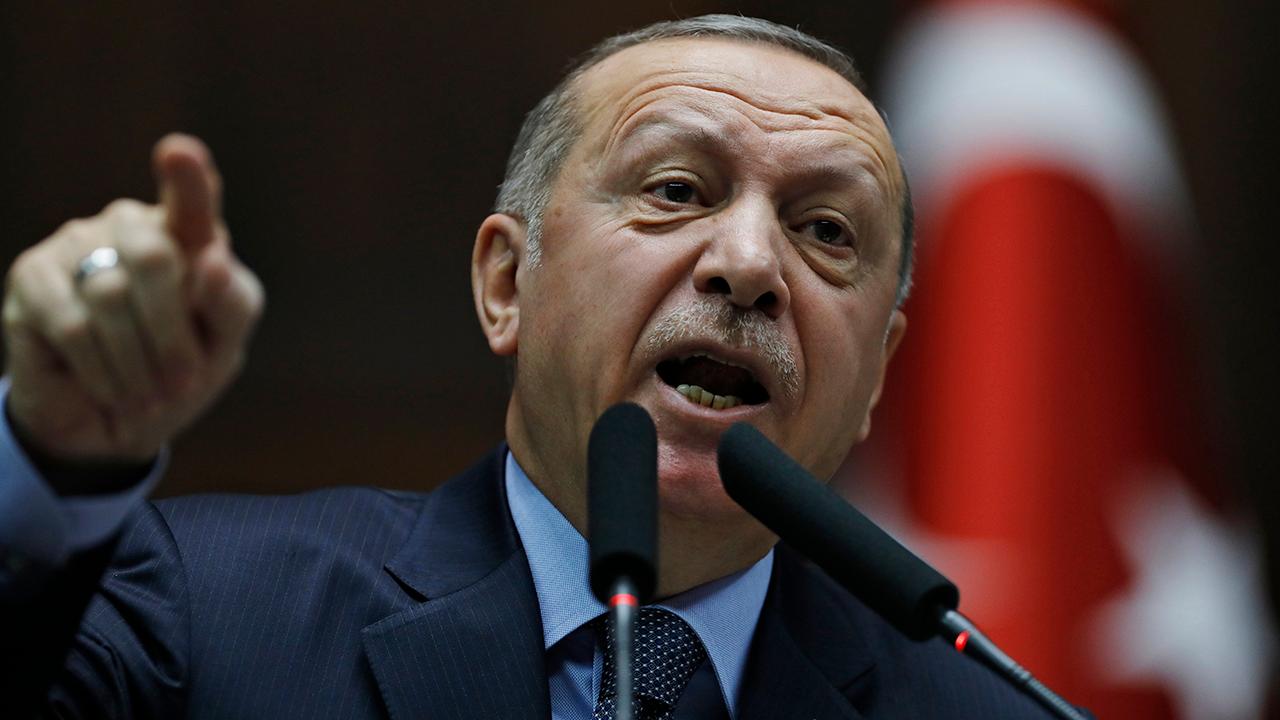President Donald Trump on Sunday tweeted that the "long overdue pullout from Syria" is starting, and threatened that the U.S. will "devastate Turkey economically" if they attack Kurdish forces in the war-torn country.
Trump said the removal of troops, which he announced via Twitter in December, is happening "while hitting the little remaining ISIS territorial caliphate hard, and from many directions." The president also vowed that the U.S. "Will attack [ISIS] again from existing nearby base if it reforms."
Trump promised the U.S. will hit Turkey financially if Ankara attacks the Kurds, but noted in a follow-up tweet that he does "not want the Kurds to provoke Turkey."
"Russia, Iran and Syria have been the biggest beneficiaries of the long term U.S. policy of destroying ISIS in Syria - natural enemies," he wrote online. "We also benefit but it is now time to bring our troops back home. Stop the ENDLESS WARS!"
A U.S. defense official told Fox News on Friday that the U.S.-led military coalition in Syria started the process of removing troops from the region, but wouldn't confirm further details for security purposes.
The announcement of a pullout is fueling concern about how quickly the U.S. will abandon its Kurdish allies, amid contradictory statements recently by Trump administration officials on an exit timetable.
The withdrawal began with shipments of military equipment, U.S. defense officials said. But in coming weeks, the contingent of about 2,000 American troops is expected to depart even as the White House says it will keep up the pressure on ISIS.
Once the troops are gone, the U.S. will have ended three years of organizing, arming, advising and providing air cover for Syrian, Kurdish and Arab fighters in an open-ended campaign devised by the Obama administration to deal ISIS a lasting defeat.
The pullout was reportedly sparked after a phone conversation between Trump and Turkish President Recep Tayyip Erdogan. His declaration of victory against ISIS was far from unanimous, and officials said U.S. defense and military leaders were trying to dissuade him from ordering the withdrawal right up until the last minute.
Trump's decision to leave Syria, which he initially said would be rapid but later slowed down, shocked U.S. allies and angered the Kurds in Syria, who are vulnerable to attack by Turkey. It also prompted the resignation of Defense Secretary Jim Mattis and drew criticism in Congress. Sen. Jack Reed, D-R.I., called the decision a "betrayal of our Kurdish partners."
GRAHAM SAYS 'I FEEL PRETTY GOOD' ABOUT SYRIA AFTER LUNCH WITH TRUMP
Turkey has recently warned that it would launch combat operations across its southern border into northeastern Syria against Kurdish forces who have been allied with the U.S. in the fight against ISIS.
Meanwhile, Israeli Prime Minister Benjamin Netanyahu confirmed Sunday that Israel had struck hundreds of Iranian and Hezbollah targets in Syria over the weekend, including a weapons facility, as the Israeli Defense Forces announced the discovery of a sixth and final tunnel dug by the Lebanese militant group for cross-border attacks.
Israel has generally refrained from commenting about the strikes for fear of triggering a reaction and being drawn into the deadly fighting in neighboring Syria's civil war.
"We have operated with impressive success in thwarting Iran from establishing a military foothold in Syria, in the framework of which the military has struck hundreds of times against Iranian and Hezbollah targets," Netanyahu said. "In the last 36 hours alone, the air force struck storage facilities with Iranian weapons at the Damascus International Airport. The bulk of recent attacks show how we are more committed than ever to act against Iran in Syria, as we promised."
Military spokesman Lt. Col. Jonathan Conricus said the latest tunnel originated from the Lebanese border town of Ramyeh, was 55 meters deep and ran 800 meters inside Lebanese territory and also "dozens" of meters into Israel. It included stairs, a rail system and a wide a passageway that allowed for the movement of equipment and a large number of forces.
CLICK HERE TO GET THE FOX NEWS APP
The tunnel would be destroyed in the coming days, Conricus said, adding that while more tunnels still existed on the Lebanese side of the border, this effectively marked the end of the ambitious military operation.
"We have achieved the goal that we set out to achieve," he said. "According to our intelligence, there are no longer any cross-border attack tunnels into Israel."
Fox News' Ryan Gaydos and The Associated Press contributed to this report.















































